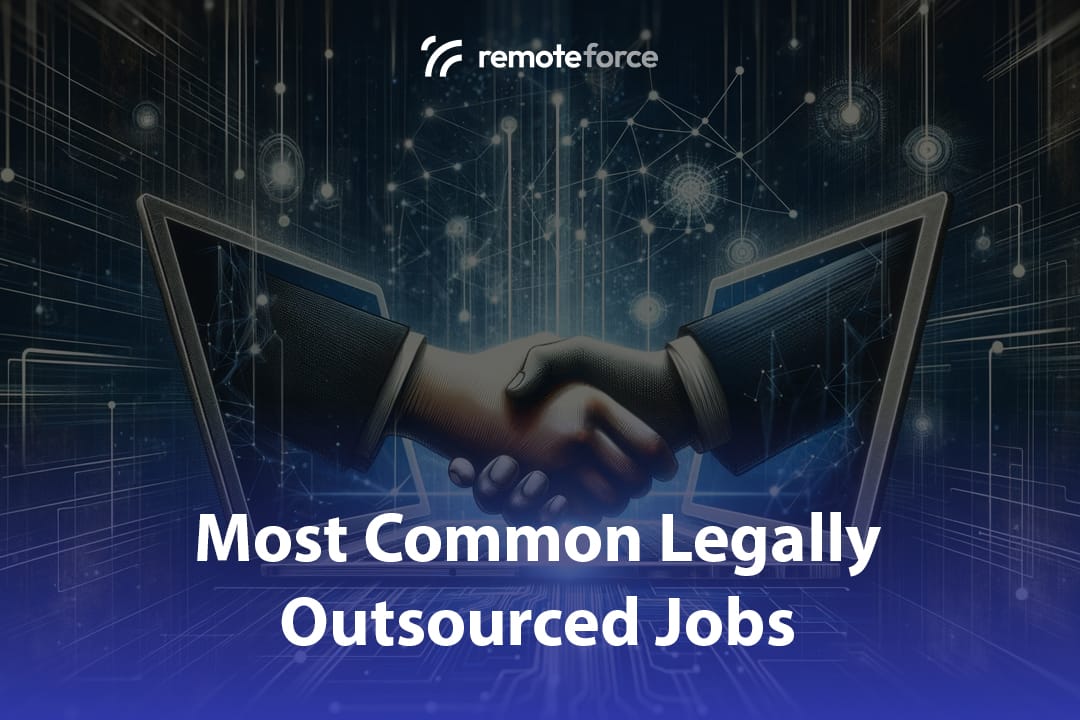Outsourcing has evolved far beyond manufacturing and call centers. Today, businesses large and small leverage outsourcing to access highly specialized skills and flexible manpower without increasing their permanent payroll or administrative burden. However, one of the most critical factors is ensuring that the outsourced roles are legally compliant and fall within the scope of permissible outsourcing jobs in the local jurisdiction.
Understanding which functions are commonly and legally outsourced is the first step toward building a risk-free partnership.
Table of Contents
ToggleThe Legal Distinction: Core vs. Non-Core Functions
Historically, many jurisdictions (especially in Asia) legally restrict outsourcing to non-core activities—functions that are supportive and do not directly relate to the client company’s primary business activity. While modern laws are often more flexible, the general principle remains: Outsourcing thrives in supportive roles.
Here are the most common job categories legally outsourced by companies today, focusing on non-core but mission-critical functions.
1. Administrative and Secretarial Support
Administrative tasks are the classic example of non-core functions that are highly effective when outsourced. They are necessary for daily operations but do not directly generate the company’s revenue.
| Role Examples | Why It’s Outsourced | Legal Compliance Note |
|---|---|---|
| Secretaries, Receptionists, Data Entry, Administrative Assistants | Reduces HR overhead, allows for specialized hiring (e.g., multilingual secretaries), and provides coverage for sick or vacation leave easily. | Ensures the outsourced worker is supervised and managed by the vendor, not the client, to maintain the legal employment separation. |
| Document Management Specialists | Manages large volumes of paper or digital records, ensuring compliance with data retention laws. |
RemoteForce Advantage: We provide highly organized and communicative Secretarial and administrative personnel, ensuring your back office runs flawlessly while staying compliant.
2. Information Technology (IT) & Technical Services
IT outsourcing is a global giant. While some high-level strategic IT roles might be considered core, the majority of development, maintenance, and support tasks are perfectly suited for outsourcing.
| Role Examples | Why It’s Outsourced | Legal Compliance Note |
|---|---|---|
| Web and App Developers (Front-End/Back-End) | Access to specific, high-demand programming skills (e.g., Python, React) without the massive salary costs. | IP Protection: The contract (SLA) must clearly state that all Intellectual Property created belongs to the client. |
| IT Support Specialists (Help Desk) | Provides 24/7 support coverage efficiently and cost-effectively. | |
| System Administrators | Manages server infrastructure and network security. |
RemoteForce Advantage: Our certified Web and App Development teams are provided under contracts that include robust IP clauses and data security protocols.
3. Marketing and Creative Services
As digital marketing is a rapidly evolving field, outsourcing gives companies instant access to current expertise and expensive software licenses without having to hire an entire specialized team.
| Role Examples | Why It’s Outsourced | Legal Compliance Note |
|---|---|---|
| Digital Marketing Specialists (SEO, SEM) | Expertise in specific algorithms and platforms that in-house teams may lack. | Data Privacy: Compliance with regional data privacy laws (e.g., GDPR, local PII regulations) when handling customer data is mandatory. |
| Graphic Designers & Content Writers | Provides scalable creative input based on project demands (e.g., seasonal campaigns). | |
| Social Media Managers | Continuous monitoring and engagement across various social platforms. |
RemoteForce Advantage: We offer specialized Digital Marketing manpower with certified expertise, guaranteeing compliance in data handling and campaign transparency.
4. Financial and Accounting Services
Financial tasks are highly regulated, making expertise and compliance non-negotiable. Outsourcing these roles transfers the risk of non-compliance to a specialized vendor.
| Role Examples | Why It’s Outsourced | Legal Compliance Note |
|---|---|---|
| Bookkeepers, Payroll Specialists, Accountants | Ensures accuracy and timely compliance with local tax and audit regulations, which are often complex. | Confidentiality: The SLA must include strict confidentiality and data protection clauses (NDAs) to safeguard sensitive financial information. |
| Accounts Payable/Receivable Specialists | Improves cash flow management and reduces the risk of fraud. |
RemoteForce Advantage: Our experienced Accounting personnel are well-versed in local financial laws, minimizing your risk of audit penalties.
5. Specialized Professional Services
For functions that require specific licenses, certifications, or regulatory knowledge, outsourcing provides immediate access to high-level expertise without the long-term commitment of a full-time senior hire.
| Role Examples | Why It’s Outsourced | Legal Compliance Note |
|---|---|---|
| Paralegals, Legal Administrators | Provides necessary support for in-house counsel, handling documentation, research, and contract management. | Professional Indemnity: The vendor should carry adequate professional indemnity insurance to cover errors or negligence in advisory roles. |
| K3L/HSE Specialists (Health, Safety, Environment) | Ensures compliance with often strict national workplace safety and environmental regulations. | |
| Recruitment Process Outsourcing (RPO) | Manages the entire hiring process—a supportive function to HR—allowing the core HR team to focus on employee relations. |
RemoteForce Advantage: We can provide legally compliant paralegal and administrative Legal support, bridging the gap between high legal costs and operational needs.
The Critical Role of Legal Compliance in Outsourcing
The jobs listed above are common because they fit well into the legal framework of outsourcing, provided the vendor adheres to strict rules:
- Vendor as the True Employer: The outsourcing company (vendor) must be the sole legal employer, managing the worker’s salary, benefits, and statutory obligations.
- Compliance with Labor Laws: The vendor must strictly follow all local labor laws regarding working hours, minimum wage, and termination procedures.
- No Core Activity Breach: The outsourced worker should not be performing the client company’s primary, revenue-generating function (e.g., a car manufacturer cannot outsource its entire assembly line under the same manpower model).
Choosing a vendor who understands and strictly follows these legal boundaries is paramount to securing the benefits of outsourcing without the accompanying legal risks.
Conclusion
Outsourcing offers scalable solutions for virtually every non-core business function, providing access to highly skilled experts in fields like Digital Marketing, Web Development, Accounting, and Legal Support. By partnering with a vendor that specializes in these legally permissible roles, you can streamline your operations, reduce overhead, and focus your internal resources on your core mission.
RemoteForce understands that legal compliance is the foundation of effective outsourcing. We specialize in providing certified, high-value manpower across all these legally outsourced categories, ensuring the entire process—from contract to daily supervision—is managed professionally and fully compliantly. Ready to acquire specialized, risk-free talent for your supportive business functions?




